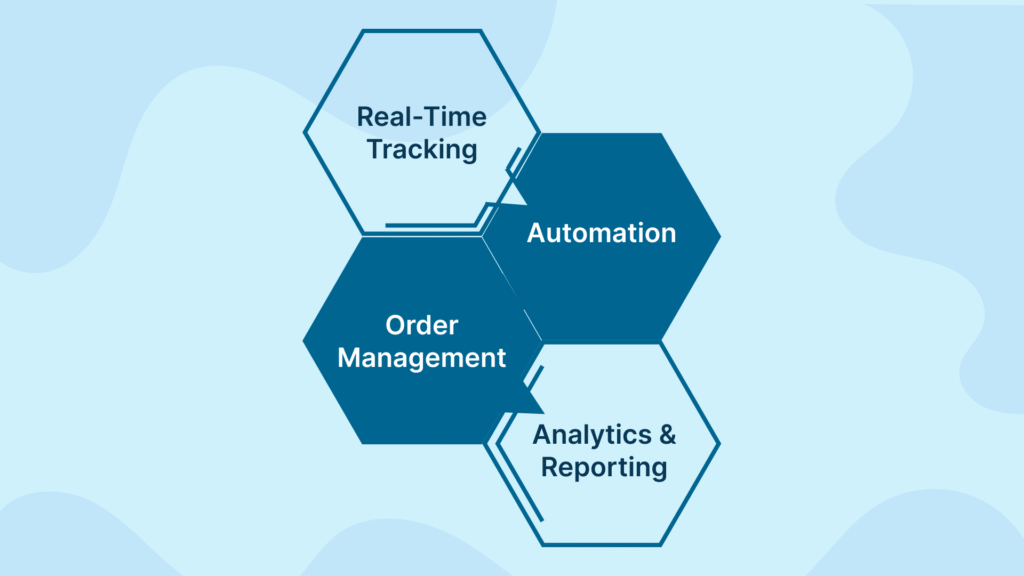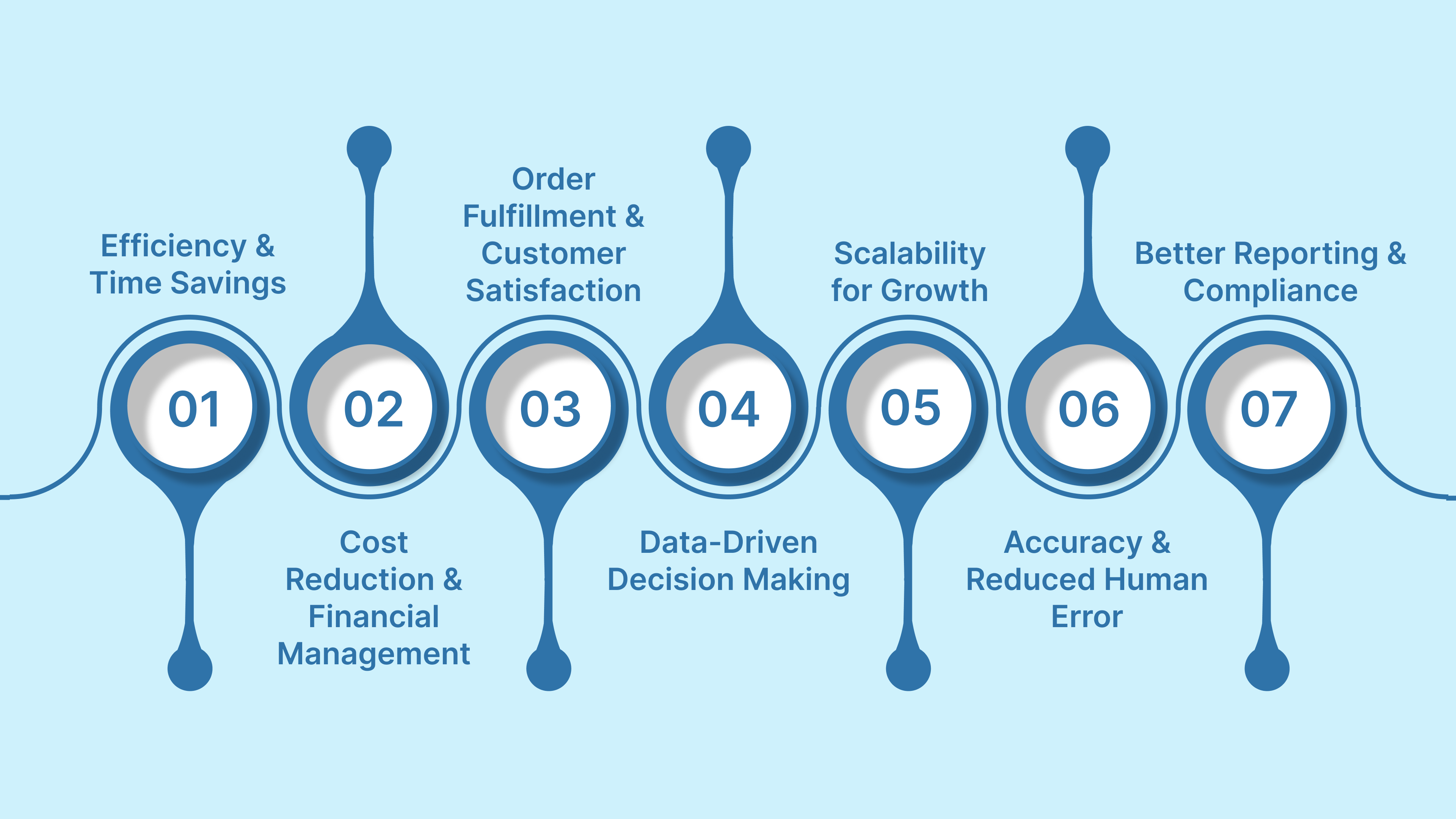For businesses like yours, whether you’re an SME, an online retailer, or an international seller, keeping track of inventory can be daunting. From managing stock levels to ensuring timely order fulfillment, the challenges can quickly add up. However, having a solid Inventory Management System (IMS) can make a difference.
The supply chain management software market, which includes inventory management solutions, in the Philippines is projected to reach USD 29.71 million in 2025. It gives significant opportunities for businesses to integrate software and hardware solutions. This growth is driven by the increasing adoption of cloud computing and IoT, transforming how businesses manage their stock.
In this blog, we’ll look at the advantages of inventory management systems and how they can help your business smooth operations, reduce costs, and enhance customer satisfaction. Let’s explore why investing in an IMS is smart for any growing business.
An Inventory Management System (IMS) is a software solution designed to help businesses efficiently manage their inventory. For SMEs, online retailers, and international sellers like you, this system is crucial in maintaining the right balance of stock, avoiding overstocking or stockouts, and ensuring smooth business operations.
An inventory management system at its core allows you to track and manage products moving through your supply chain from receiving shipments to storing items and eventually selling them to customers. But an effective IMS goes beyond basic tracking. It integrates with your sales, procurement, and order fulfillment processes, offering real-time insights into stock levels, trends, and performance.

These features work together to provide a comprehensive solution for managing your inventory efficiently. Let’s explore how these capabilities can specifically benefit your business and why an IMS is a turning point for SMEs, online retailers, and international sellers.
Having covered what an IMS is and its key features, let’s look at the advantages of inventory management systems and explore how these benefits can help optimize your business operations and drive growth.
Also Read: Understanding Merchandise Inventory: Essential Guide for Sellers

An Inventory Management System (IMS) offers numerous benefits that are especially valuable for SMEs, online retailers, and international sellers. By providing accurate, real-time insights into stock levels, managing processes, and automating key tasks, IMS helps businesses improve efficiency, reduce costs, and enhance customer satisfaction. Here are the key advantages of using an IMS:
Efficient inventory management is crucial for maintaining smooth operations and ensuring your business runs without unnecessary delays. An IMS significantly reduces the time spent on manual processes, helping businesses save time, reduce errors, and improve overall productivity. Let’s break down how these features help manage your operations:
Efficient inventory management isn’t just about saving time; it’s also about cost savings and better financial control. With an IMS, businesses can more effectively manage their stock and reduce operational costs. Here’s how:
Order fulfillment is key to customer satisfaction, and an IMS plays a significant role in making sure the process is efficient. Let’s take a look at how this system improves order fulfillment and boosts customer loyalty:
An IMS doesn’t just track inventory. It also provides valuable data insights that help businesses make more informed decisions. Here’s how data analytics can take your inventory management to the next level:
As your business grows, managing larger inventories can become more complex. An IMS grows with your business, ensuring that you can scale operations smoothly. Let’s explore how an IMS supports your business’s expansion:
By automating inventory management, IMS reduces the risk of human error and improves accuracy in stock management. Here’s how it minimizes mistakes and ensures reliable inventory data:
Having access to accurate, detailed reports is essential for business operations and regulatory compliance. Here’s how an IMS helps with reporting and staying compliant:
Though an Inventory Management System (IMS) can significantly improve your operations, implementing it comes with its own set of hurdles. Recognizing and addressing these challenges head-on is key to ensuring that your business can fully capitalize on the benefits of efficient inventory management.
Also Read: Improving Stock Control Systems: Methods and Best Practices
Many businesses, particularly SMEs, online retailers, and international sellers, face hurdles when implementing and managing an IMS. Understanding these challenges and how to overcome them can ensure you fully benefit from the system’s advantages:
One of the biggest challenges businesses face is integrating an IMS with existing business systems, such as sales, procurement, and order fulfillment. For many SMEs and online retailers, there’s a risk of data silos if the IMS isn’t properly synced with other tools used in daily operations.
Solution: To mitigate this, it’s essential to choose an IMS that offers easy integration with existing systems, or work with a provider who can ensure smooth data exchange between platforms. Integration is key to maintaining accurate, real-time data across all business functions.
The initial setup of an IMS, including purchasing the software, setting up the system, and training staff, can be a costly and time-consuming process. Many businesses, particularly small and medium-sized enterprises, may struggle with upfront costs and the resource commitment required for training.
Solution: Look for IMS providers that offer cost-effective solutions customized to your business size, as well as cloud-based options to reduce infrastructure costs. Additionally, invest in ongoing training and support to ensure your team is fully equipped to use the system efficiently.
An IMS is only as effective as the data it receives. The system will not perform optimally if your inventory data is inaccurate, outdated, or poorly managed. For many businesses, ensuring data accuracy across multiple locations or sales channels can be a challenge.
Solution: Regular audits and proper data entry protocols are essential for maintaining high-quality data. Implementing barcoding and real-time updates can help ensure accurate and up-to-date inventory data.
Employees accustomed to traditional inventory management methods may resist transitioning to an IMS. This resistance can slow down adoption, affecting the system’s effectiveness and the business’s ability to realize its benefits fully.
Solution: Overcome this challenge by focusing on employee engagement and demonstrating the long-term benefits of an IMS. Provide training and emphasize how the system will ease their workload and improve accuracy. Clear communication about the role of the IMS in reducing manual labor will help gain buy-in from the team.
As your business grows, your inventory management needs will evolve. One common challenge is ensuring that the IMS you choose can scale with your business, accommodating growing product lines, sales channels, and locations.
Solution: Choose an IMS that is flexible and scalable. A cloud-based solution is often a good choice as it can grow with your business and allow for easy updates and expansion. Additionally, ensure that your IMS integrates easily with future technologies you may adopt, such as IoT or AI.
While an IMS can save money in the long run, it may take some time to see the return on investment (ROI). For SMEs and online retailers with tight budgets, managing the cost of an IMS implementation while waiting for benefits to materialize can be challenging.
Solution: Focus on minor, incremental improvements in inventory management that lead to cost savings over time. For example, optimizing stock levels and reducing wastage can result in significant savings without requiring a huge initial investment.
By addressing integration issues, ensuring data accuracy, and managing employee adoption, businesses can overcome the hurdles and realize the full potential of an IMS.
If you’re ready to manage your inventory management and overcome these challenges, contact us today and discover how we can help optimize your operations.
At Inspire Solutions, we understand the challenges businesses face when it comes to implementing and managing an Inventory Management System (IMS). That’s why we offer a range of services designed to help smooth your inventory management process and ensure smooth operations. From system integration to ongoing support, we’re here to guide you every step of the way. Here’s how Inspire Solutions can help:
At Inspire Solutions Asia, we’re committed to helping you optimize your inventory management system and overcome any challenges you may face. From smooth system integration to ongoing support, our team ensures that your business operates efficiently, reduces costs, and effectively meets customer demands.
Get a quote today to discuss how we can customize an IMS solution that fits your business needs and helps you stay ahead of the competition.
Implementing an Inventory Management System (IMS) can transform businesses, especially for SMEs, online retailers, and international sellers. Despite the challenges that may arise during implementation, the benefits far outweigh the obstacles, enabling your business to grow sustainably and stay competitive in the market.
At Inspire Solutions, we understand the complexities of adopting and optimizing an IMS. Our customized services are designed to support you through every process step, from system integration and training to ensuring scalability as your business grows.
By using an effective inventory management system, you can unlock new levels of efficiency, reduce risks, and provide a better customer experience.
Schedule a meeting today to explore how we can help you manage your inventory and drive your business forward.